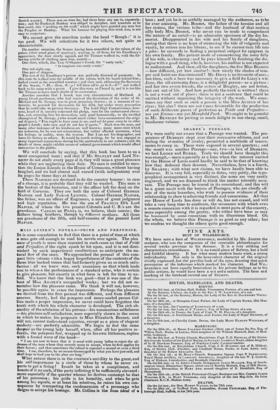MISS AUSTEN'S NOVELS—PRIDE AND PREJUDICE.
IT is some consolation to find that there is a point of time at which a man gets old enough to read his novels over again; The plea sure of youth is more than repeated in such cases as that of Pride and PrPjadiee, if' the right epoch be hit upon, and it is not dimi- nished by such impertinent recollections as anticipate the na- tural flow of the story. We approached the perusal of this com- pact little volume a ith a happy forgetfulness of the contents of the three blue backed tomes that had formerly given us so much satis- faction : all we knew was, such assurance as that which leads you to witness the performance of a standard actor, who is certain to give pleasure, but exactly in what form is left for time to un- fold. We knew that the book was good—that it was one of the best of Miss AUSTEN'S unequalled works ; but we did not re- member how the pleasure came. We think it will not, however, be possible again to erase the impression. Perhaps the pleasure we derived from the first perusal was different, and from different sources. Surely, had the pompous and mean-souled parson Col- lins made a proper impression, we never could have forgotten the truth with which his whole character is developed. The rich ab- surdity of the adulation of his patrons—his unconscious selfishness —his glorious self-satisfaction, more especially shown in the scene in which he makes his proposals to Miss Elizabeth Bennet, and will not, cannot understand rejection, except as a piece of elegant modesty—are perfectly admirable. We begin to feel the same despair as the young lady herself, when, after all her positive re- fusals, the pompous fool, wrapped up in his own littleness, replies with a formal wave of the hand- " I am not now to learn that it is usual with young ladies to reject the ad- dresses of the man whom they secretly mean to accept, when he first applies for their favour; and that sometimes the refusal is repeated a second or even a third time. I am, therefore, by no means discouraged by what you have just said, and shall hope to lead you to the altar ere long." What nature there is in the creature's servility to the great, and his self-importance in a circle of those by whom he never ex- pects to get a living! Insult he takes as a compliment, and boasts of it as such, if the party inflicting it be sufficiently elevated: more especially if the quarter whence he derives contempt be that of his patroness ; his pride is his humility, and when he gets among his equals, or at least his relatives, he raises his own con- sequence by trumpeting the condescension of a personage who deigns to accept his homage. Mr. Collins is the beau ideal of a bore ; and yet he is so artfully managed by the authoress, as to be for ever amusing. Mr. Bennet, the father of the heroine and all her sisters, the various tribe—and the husband of that restless silly body Mrs. Bennet, who never can be made to comprehend the nature of an entail—is an admirable specimen of the dry hu- morist. Disappointed in his wife and his family of daughters, seeing that there is no hope of stemming the tide of vulgarity and vanity, he retires into his library, to see if lie cannot turn life into a joke: he succeeds in finding a perpetual subject for epigram in his own family. His patient mode of encountering the noisy folly of his wife, is charming ; and he pays himself by finishing the dia- logue with a good thing, which, however, his auditor is not expected to understand. And then, all the daughters, the five Miss Bennets —how different, yet how similar!—how nicely the shades of tem- per and habit are discriminated ! Mr. Darcy is no favourite of ours ; but then, such a hero was necessary to give a field for Lizzy's wit. Jane, the all-excusing Jane, is a delightful person—as a picture : and her two sworn friends, the sisters of Bingley, are not fiction, but cut out of life. And how perfectly the work is written ! there is not a word out of place; there is not a sentence that could be omitted without impairing the integrity of the work. We some- times say that such or such a person is the Miss AUSTEN of her class; but alas ! these are not tunes favourable for the production of such deliberate pieces of perfection as Pride and Prejudice— nor yet Emma—nor yet Mansfield Park. We ought to be grateful to Mr. BENTLEY for putting so much delight in one cheap, small, handsome volume.
























 Previous page
Previous page